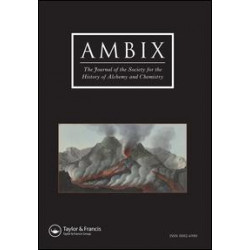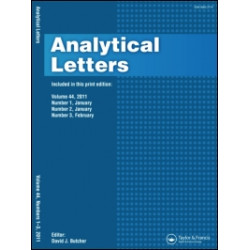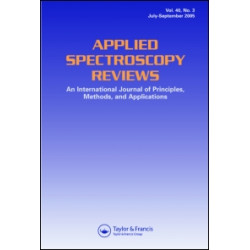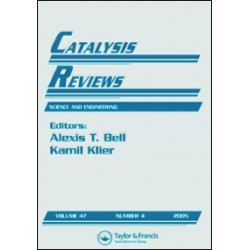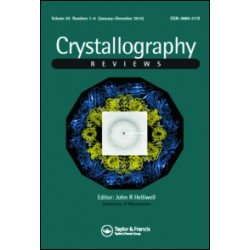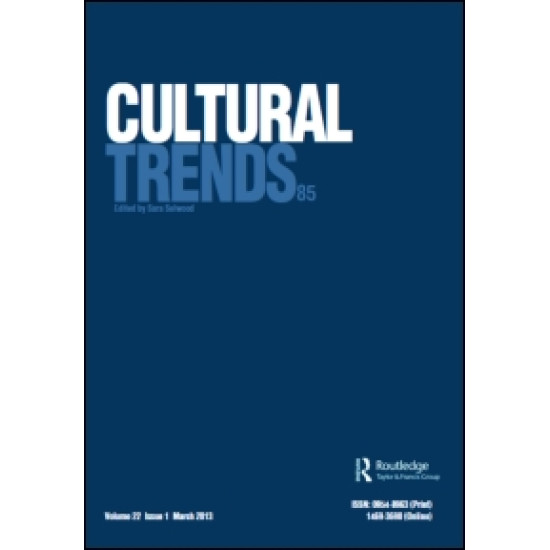
Cultural Trends
Cultural Trends has been providing in-depth analysis of the cultural sector since 1989. It focuses on key trends within the arts, culture, heritage and media and it offers overviews of the sector as a whole.
Cultural Trends is committed to the principle that cultural policy should be rooted in empirical evidence. To this end, it champions better information on the cultural and creative sectors and its widespread dissemination. It aims to:
• stimulate analysis and understanding of culture and the creative sectors based on relevant and reliable data;
• provide a critique of the empirical evidence upon which policy on culture and the creative industries may be based, implemented, evaluated and developed;
• examine the soundness of measures of the performance of government and public sector bodies pertaining to the cultural and creative sectors; and
• encourage improvements in the coverage, timeliness and accessibility of data on culture and the creative industries.
All articles in Cultural Trends are peer reviewed and may be appended by expert commentaries, which further explore and analyze the subjects covered.
The journal is widely read and referred to by funders, sponsors and administrative bodies; local and central government officials; by broadcasters and journalists, researchers, consultants and academics, and by those concerned with the promotion and development of the cultural and creative sectors.
Peer review policy
Research articles published in Cultural Trends are reviewed by three peer reviewers. Submitting authors are invited to suggest up to four peer reviewers who may, or may not be, approached by the journal. Names of authors are given to reviewers.
Reviewers have the choice of being anonymous or attributed. In order to avoid any conflict of interest, authors are asked to explain their selection of reviewers, and reviewers are asked to describe their relationship with authors.
Reviewers are sent guidelines and asked to complete a standard review template.
Book reviews and policy perspectives
If there’s a book related to Cultural Trends’ scope and aims, or a policy, speech, or piece of grey literature that you’d like to review, please contact our Book Review and Policy Perspectives Editor, Steven Hadley, at shadley01@qub.ac.uk with your suggestion. We are happy to discuss and develop ideas for proposals, and are keen to hear from a variety of reviewers ranging from PhD candidates to experienced academics and professionals working in the cultural and creative industries.
Reviews: If Steven agrees that your proposed review fits with the aims of the journal, he will ask the publisher to send you out a review copy so you can submit a review for potential publication in the journal. We normally ask for reviews of between 1200-1500 words and to be submitted within a month from receipt of the book.
Policy perspectives: Reviews of international policies and grey literature are also welcome. Reviews are normally in the region of 1500 words, although this can be increased in discussion with the Editor. Please note that we also ask, when considering reviews from post-graduate students, for assurance that their supervisor has read and commented on the first draft of the submission.
Cultural Trends is committed to the principle that cultural policy should be rooted in empirical evidence. To this end, it champions better information on the cultural and creative sectors and its widespread dissemination. It aims to:
• stimulate analysis and understanding of culture and the creative sectors based on relevant and reliable data;
• provide a critique of the empirical evidence upon which policy on culture and the creative industries may be based, implemented, evaluated and developed;
• examine the soundness of measures of the performance of government and public sector bodies pertaining to the cultural and creative sectors; and
• encourage improvements in the coverage, timeliness and accessibility of data on culture and the creative industries.
All articles in Cultural Trends are peer reviewed and may be appended by expert commentaries, which further explore and analyze the subjects covered.
The journal is widely read and referred to by funders, sponsors and administrative bodies; local and central government officials; by broadcasters and journalists, researchers, consultants and academics, and by those concerned with the promotion and development of the cultural and creative sectors.
Peer review policy
Research articles published in Cultural Trends are reviewed by three peer reviewers. Submitting authors are invited to suggest up to four peer reviewers who may, or may not be, approached by the journal. Names of authors are given to reviewers.
Reviewers have the choice of being anonymous or attributed. In order to avoid any conflict of interest, authors are asked to explain their selection of reviewers, and reviewers are asked to describe their relationship with authors.
Reviewers are sent guidelines and asked to complete a standard review template.
Book reviews and policy perspectives
If there’s a book related to Cultural Trends’ scope and aims, or a policy, speech, or piece of grey literature that you’d like to review, please contact our Book Review and Policy Perspectives Editor, Steven Hadley, at shadley01@qub.ac.uk with your suggestion. We are happy to discuss and develop ideas for proposals, and are keen to hear from a variety of reviewers ranging from PhD candidates to experienced academics and professionals working in the cultural and creative industries.
Reviews: If Steven agrees that your proposed review fits with the aims of the journal, he will ask the publisher to send you out a review copy so you can submit a review for potential publication in the journal. We normally ask for reviews of between 1200-1500 words and to be submitted within a month from receipt of the book.
Policy perspectives: Reviews of international policies and grey literature are also welcome. Reviews are normally in the region of 1500 words, although this can be increased in discussion with the Editor. Please note that we also ask, when considering reviews from post-graduate students, for assurance that their supervisor has read and commented on the first draft of the submission.
₹54,602.10







